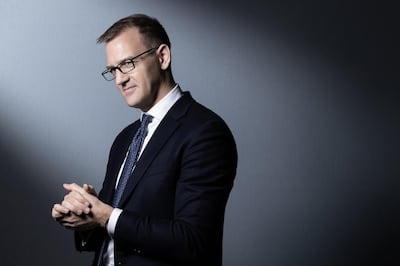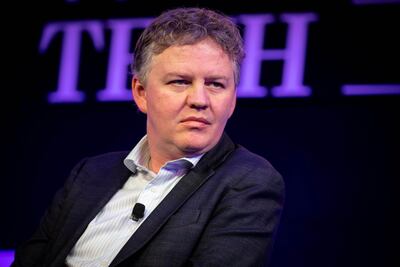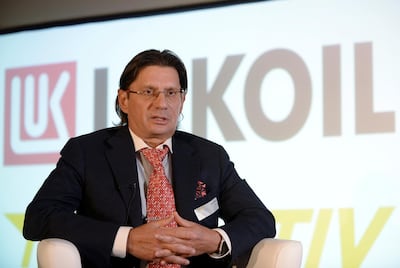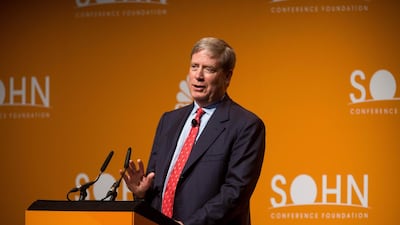Stan Druckenmiller and David Tepper
American investor Stan Druckenmiller said the risk-reward calculation for equities is the worst he's seen in his career, and that the US government stimulus programmes won't be enough to overcome real world economic problems.
"The consensus out there seems to be: 'Don't worry, the Fed has your back'," said Mr Druckenmiller on Tuesday during a webcast held by The Economic Club of New York. "There's only one problem with that: our analysis says it's not true."
While traders think there is "massive" liquidity and that the stimulus programmes are big enough to solve the problems facing the US, the economic effects of the coronavirus are likely to be long lasting and will lead to a slew of bankruptcies, he said.
"I pray I'm wrong on this, but I just think that the V-out is a fantasy," the legendary hedge fund manager said, referring to a V-shaped recovery.
The 66-year-old said his analysis showed liquidity that drove markets higher will soon shrink as Treasury borrowing crowds out the private economy and even overwhelms Fed purchases. He said he’s never seen a time when the risk of owning stocks so outweighed the potential gain.
Mr Druckenmiller's remarks stand in contrast to the optimism that has pushed the S&P 500 Index to rally almost 30 per cent since its March low, even as the pandemic has brought the economy to a standstill, seized up credit markets and ended the longest bull market in history.
The damage spurred the US Federal Reserve to unveil a raft of emergency lending programmes and Congress to unleash almost $3 trillion (Dh11tn) in stimulus funds.
David Tepper, who runs the $13 billion Appaloosa hedge fund, also sounded the alarm on Wednesday. He told CNBC that next to 1999, equities are overvalued the most he’s ever seen. He said valuations are “nuts” for some individual stocks on the Nasdaq, and highlighted banks and airlines as difficult areas in which to invest right now.
Mr Tepper has been steadily returning money to client investors in recent years. The 62-year-old has a net worth of $12bn, according to Forbes.
Bank stocks tumbled to the lowest since early April following Mr Tepper's comments and a grim outlook on the economy from Federal Reserve Chairman Jerome Powell.
Other American money managers including Bill Miller, Paul Singer and Paul Tudor Jones have all recently voiced doubts about markets or the economy.
The warnings have caught the attention of President Donald Trump, who is facing re-election and has seen his plans to run on a booming economy shredded by the virus. Mr Trump attacked "so-called 'rich guys'" in a tweet on Wednesday.
“You must always remember that some are betting big against it, and make a lot of money if it goes down,” Mr Trump wrote about the stock market. “Then they go positive, get big publicity, and make it going up. They get you both ways.”

Daniel Kretinsky
Czech billionaire Daniel Kretinsky took a stake in Macy's and plans to engage management on ways to improve the performance of the struggling US retailer.
Mr Kretinsky's Vesa Equity Investment amassed a 5 per cent holding in Macy's for strategic investment purposes, according to a securities filing. The purchase makes him one of the company's top five shareholders, according to Bloomberg data.
Macy's has been plagued by rising uncertainty since the coronavirus outbreak forced it to close its stores and furlough most of its workers. The chain, which saw its sales declines even before the pandemic, has been seeking additional sources of financing as the lockdown has caused revenue to dry up.
In March, Macy's was booted off the S&P 500 and its credit rating was cut to junk by Fitch in April.
Macy's shares have slumped almost 70 per cent this year. The stock fell as much as 3.9 per cent in New York on Monday.
Mr Kretinsky, who tested positive for the coronavirus in March, has shown an interest in troubled retailers. He invested in France's Casino Guichard-Perrachon last year after a $6.5bn takeover offer for German wholesaler Metro was rebuffed.
In April, following his recovery, Mr Kretinsky, 44, said in an email: "We are already investing as we simply believe that the current market is undervaluing certain very interesting and important companies."
Mr Kretinsky, the owner of Czech energy conglomerate EPH, also owns media assets and the Sparta Prague football team. He has a net worth of $3.4bn, according to Forbes.

Matthew Prince
Cloudflare chief executive Matthew Prince became a billionaire on May 7 after the stock climbed to a record hours before the company's scheduled earnings report.
Shares of the San Francisco-based firm advanced 14 per cent to $28.52, giving Mr Prince a net worth of $1.08bn, according to the Bloomberg Billionaires Index.
Cloudflare has been aided by the surge in streaming, gaming and e-commerce as people stay at home. It provides services such as firewalls, network routing and traffic management that allow cloud-based sites to operate more effectively.
The company's stock has soared about 90 per cent since its September initial public offering.
Mr Prince, who helped launch Cloudflare in 2009, owns about 12.5 per cent of the company, according to its latest proxy filing.
The 46-year-old joins a growing list of tech entrepreneurs whose fortunes have surged on pandemic-induced increases in demand for services. They include Amazon founder Jeff Bezos, Reed Hastings of Netflix and Zoom Video Communications' Eric Yuan, whose net worth has more than doubled this year to about $7.8bn.
Cloudflare shares subsequently lost some of their gains after the company reported a bigger quarterly loss of $32.7 million, compared with a loss of $17.1m a year earlier. Its revenue jumped 48 per cent to $91m, while operating expenses surged 65 per cent.
"Our scalable global network is solving digital transformation needs for our customers in hours or minutes, faster than hardware could even ship to vacant offices," Mr Prince said in a statement.

Leonid Fedun
Leonid Fedun, a billionaire shareholder at Russia's second-biggest oil producer, was hospitalised earlier this month with Covid-19 as the epidemic spreads rapidly throughout the country.
Mr Fedun is Russia's 17th richest man, with a fortune of $6.3bn, according to the Bloomberg Billionaires Index, and the first Russian on that list to publicly confirm he is ill with the disease.
His Spartak Moscow football club, where he serves as chairman, published a three-sentence statement about his health on its website on May 7. Lukoil, the oil producer in which Mr Fedun and his family are the largest shareholders with about 12 per cent, declined to comment.
Russia now has the second largest number of Covid-19 infections after the US, with more than 242,000 confirmed cases as of Thursday, according to the Johns Hopkins University tracker.
The country is contending with the fallout from coronavirus-related shutdowns as well as the epidemic's impact on demand for oil, its most important export. Economic activity has contracted by a third since the movement restrictions began, while tax collection collapsed 30 per cent in April.
While Mr Fedun is the first Russian billionaire with Covid-19, the country's political elite has not been spared. Three government ministers, including Prime Minister Mikhail Mishustin, have been diagnosed with the disease.

